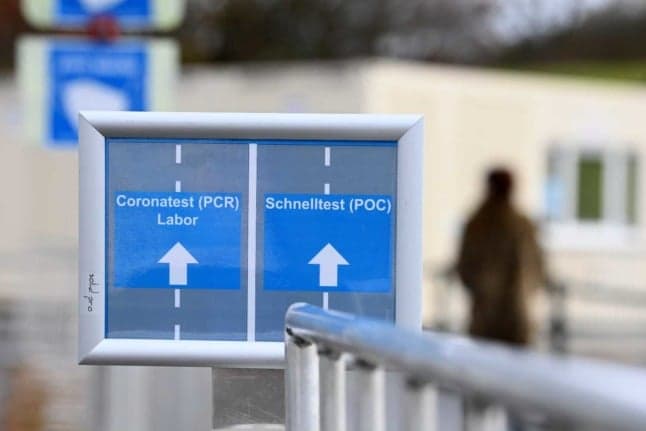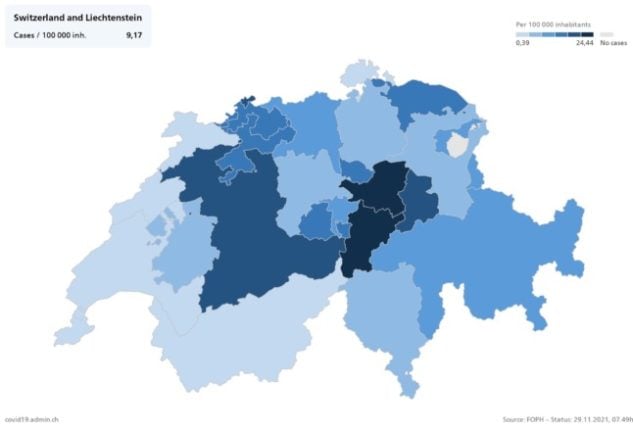REVEALED: Why Covid rates in some Swiss cantons are ‘five times’ higher

Infection rates in several smaller, German-speaking cantons are five times higher than those in Ticino. Why?
New analysis by Switzerland’s NZZ newspaper shows which factors are the most important in determining a canton’s infection rates.
The analysis, published on November 30th and taking into account infection data across the previous two weeks, sought to get to the bottom of why some Swiss cantons had confirmed case levels five times higher than those in other cantons.
The analysis, which is available here (in German), took into account seven different factors including voting behaviour, vaccination rates and population density.
KEY POINTS: What are the new Covid travel rules between Switzerland and the UK?
The authors found that only two factors truly showed a meaningful correlation, while the others seemingly had a negligible influence on infection rates.
Infection rates five times higher in some cantons
According to the authors, the starting point for the piece was the significant differences in infection rates from canton to canton.
Covid measures, testing policy, healthcare quality and access to vaccination is roughly similar in each of Switzerland’s 26 cantons.
Over the period surveyed, there were 378 cases per 100,000 inhabitants in the southern canton of Ticino.
In the smaller, central cantons however, cases per 100,000 inhabitants was as high as 1,817 (Appenzell Ausserrhoden) - almost five times higher than in Ticino - along with 1,752 (Schwyz), Nidwalden (1,723) and Appenzell Innerhoden (1,596).
While Ticino had by far the lowest number of infections, lower case rates were also recorded per 100,000 people in Neuchâtel (560) and Vaud (582).
‘Critical situation’: Switzerland’s new coronavirus hotspots
The following map shows case rates in Switzerland and collaborates the findings from the NZZ.
Please note that while the trends are largely similar, the map relates to November 14th to 29th, whereas the NZZ’s analysis runs from November 11th to 25th.

What factors determine a canton’s case rate?
In wanting to explain the differences, the NZZ said they boiled down seven factors which could influence a canton’s infection rates.
These factors are: vaccination rate, mobility, immunity rate (through recovery), geographic location, population density, political preferences and education level.
The authors acknowledged that this was not an exclusive list of every relevant factor underpinning a canton’s case rates, but hoped the criteria would account for as many relevant factors as could be considered.
Of these seven factors, only two played a more than negligible role in a canton’s infection rate.
Reader question: Does a booster shot extend the validity of Switzerland’s Covid certificate?
Political leanings
The first, which accounted for 62 percent of the differences between cantons, was the amount of Swiss People’s Party (SVP) voters a region had.
The SVP, which is described as either right-wing or far-right by most political analysis, is most popular in smaller, German-speaking parts of the country.
The authors pointed to several studies, including one by Swiss research agency Sotomo, which showed that SVP voters were much less willing to vaccinate than voters from other political parties.
The SVP was the only mainstream political party to support a vote against Switzerland’s Covid measures including the Covid certificate in November’s referendum.
The only two cantons to vote against the Covid measures at the referendum were Schwyz and Appenzell Innerhoden, which have some of the country’s highest case rates.
Ueli Maurer, a two-time President of Switzerland who is a member of right-wing Swiss People’s Party (SVP), was photographed at an SVP event in September wearing the Freiheitstrychler shirt.
Ich ziehe meinen Hut vor Freiheitstrychler Ueli Maurer, ein senkrechter Schweizer! ✊🏻💜 pic.twitter.com/nYxLC9u8yP
— Nicolas A. Rimoldi 💜 (@narimoldi) September 12, 2021
Freiheitstrychler (“freedom bell ringers”) on the other hand, is an offshoot, militant group of the traditional ringers, who have been voicing their disagreement with the government’s anti-Covid measures.
Freiheitstrychler: Who are Switzerland’s ‘freedom bell ringers’?
Vaccination rate
The only other factor to make a significant difference is vaccination rate.
The authors found vaccination rate explained 36 percent of the differences between cantonal infection rates.
The study showed that an increase in the cantonal vaccination rate by one percentage point resulted in a decline in case numbers by 63 per 100,000 inhabitants.
Other research has shown that although people who are vaccinated can still spread the virus, the unvaccinated are three times more contagious than the vaccinated, showing how effective the vaccines are at stopping the spread.
Swiss Covid Task Force: Unvaccinated are three times more contagious
What does this mean for Switzerland?
The authors speculated on why certain factors were important and why others weren’t.
For instance, they noted that a similar analysis performed in September showed a higher correlation between vaccination and lower infection rates.
They said this may illustrate the decline in the long-term protection offered by the current vaccines - and a need for Switzerland to speed up its booster campaign.
On the other hand, the apparent lack of impact of Covid immunity through prior infection on case rates shows that vaccinations play a key role in preventing the spread of the virus.
Comments
See Also
New analysis by Switzerland’s NZZ newspaper shows which factors are the most important in determining a canton’s infection rates.
The analysis, published on November 30th and taking into account infection data across the previous two weeks, sought to get to the bottom of why some Swiss cantons had confirmed case levels five times higher than those in other cantons.
The analysis, which is available here (in German), took into account seven different factors including voting behaviour, vaccination rates and population density.
KEY POINTS: What are the new Covid travel rules between Switzerland and the UK?
The authors found that only two factors truly showed a meaningful correlation, while the others seemingly had a negligible influence on infection rates.
Infection rates five times higher in some cantons
According to the authors, the starting point for the piece was the significant differences in infection rates from canton to canton.
Covid measures, testing policy, healthcare quality and access to vaccination is roughly similar in each of Switzerland’s 26 cantons.
Over the period surveyed, there were 378 cases per 100,000 inhabitants in the southern canton of Ticino.
In the smaller, central cantons however, cases per 100,000 inhabitants was as high as 1,817 (Appenzell Ausserrhoden) - almost five times higher than in Ticino - along with 1,752 (Schwyz), Nidwalden (1,723) and Appenzell Innerhoden (1,596).
While Ticino had by far the lowest number of infections, lower case rates were also recorded per 100,000 people in Neuchâtel (560) and Vaud (582).
‘Critical situation’: Switzerland’s new coronavirus hotspots
The following map shows case rates in Switzerland and collaborates the findings from the NZZ.
Please note that while the trends are largely similar, the map relates to November 14th to 29th, whereas the NZZ’s analysis runs from November 11th to 25th.

What factors determine a canton’s case rate?
In wanting to explain the differences, the NZZ said they boiled down seven factors which could influence a canton’s infection rates.
These factors are: vaccination rate, mobility, immunity rate (through recovery), geographic location, population density, political preferences and education level.
The authors acknowledged that this was not an exclusive list of every relevant factor underpinning a canton’s case rates, but hoped the criteria would account for as many relevant factors as could be considered.
Of these seven factors, only two played a more than negligible role in a canton’s infection rate.
Reader question: Does a booster shot extend the validity of Switzerland’s Covid certificate?
Political leanings
The first, which accounted for 62 percent of the differences between cantons, was the amount of Swiss People’s Party (SVP) voters a region had.
The SVP, which is described as either right-wing or far-right by most political analysis, is most popular in smaller, German-speaking parts of the country.
The authors pointed to several studies, including one by Swiss research agency Sotomo, which showed that SVP voters were much less willing to vaccinate than voters from other political parties.
The SVP was the only mainstream political party to support a vote against Switzerland’s Covid measures including the Covid certificate in November’s referendum.
The only two cantons to vote against the Covid measures at the referendum were Schwyz and Appenzell Innerhoden, which have some of the country’s highest case rates.
Ueli Maurer, a two-time President of Switzerland who is a member of right-wing Swiss People’s Party (SVP), was photographed at an SVP event in September wearing the Freiheitstrychler shirt.
Ich ziehe meinen Hut vor Freiheitstrychler Ueli Maurer, ein senkrechter Schweizer! ✊🏻💜 pic.twitter.com/nYxLC9u8yP
— Nicolas A. Rimoldi 💜 (@narimoldi) September 12, 2021
Freiheitstrychler (“freedom bell ringers”) on the other hand, is an offshoot, militant group of the traditional ringers, who have been voicing their disagreement with the government’s anti-Covid measures.
Freiheitstrychler: Who are Switzerland’s ‘freedom bell ringers’?
Vaccination rate
The only other factor to make a significant difference is vaccination rate.
The authors found vaccination rate explained 36 percent of the differences between cantonal infection rates.
The study showed that an increase in the cantonal vaccination rate by one percentage point resulted in a decline in case numbers by 63 per 100,000 inhabitants.
Other research has shown that although people who are vaccinated can still spread the virus, the unvaccinated are three times more contagious than the vaccinated, showing how effective the vaccines are at stopping the spread.
Swiss Covid Task Force: Unvaccinated are three times more contagious
What does this mean for Switzerland?
The authors speculated on why certain factors were important and why others weren’t.
For instance, they noted that a similar analysis performed in September showed a higher correlation between vaccination and lower infection rates.
They said this may illustrate the decline in the long-term protection offered by the current vaccines - and a need for Switzerland to speed up its booster campaign.
On the other hand, the apparent lack of impact of Covid immunity through prior infection on case rates shows that vaccinations play a key role in preventing the spread of the virus.
Join the conversation in our comments section below. Share your own views and experience and if you have a question or suggestion for our journalists then email us at [email protected].
Please keep comments civil, constructive and on topic – and make sure to read our terms of use before getting involved.
Please log in here to leave a comment.